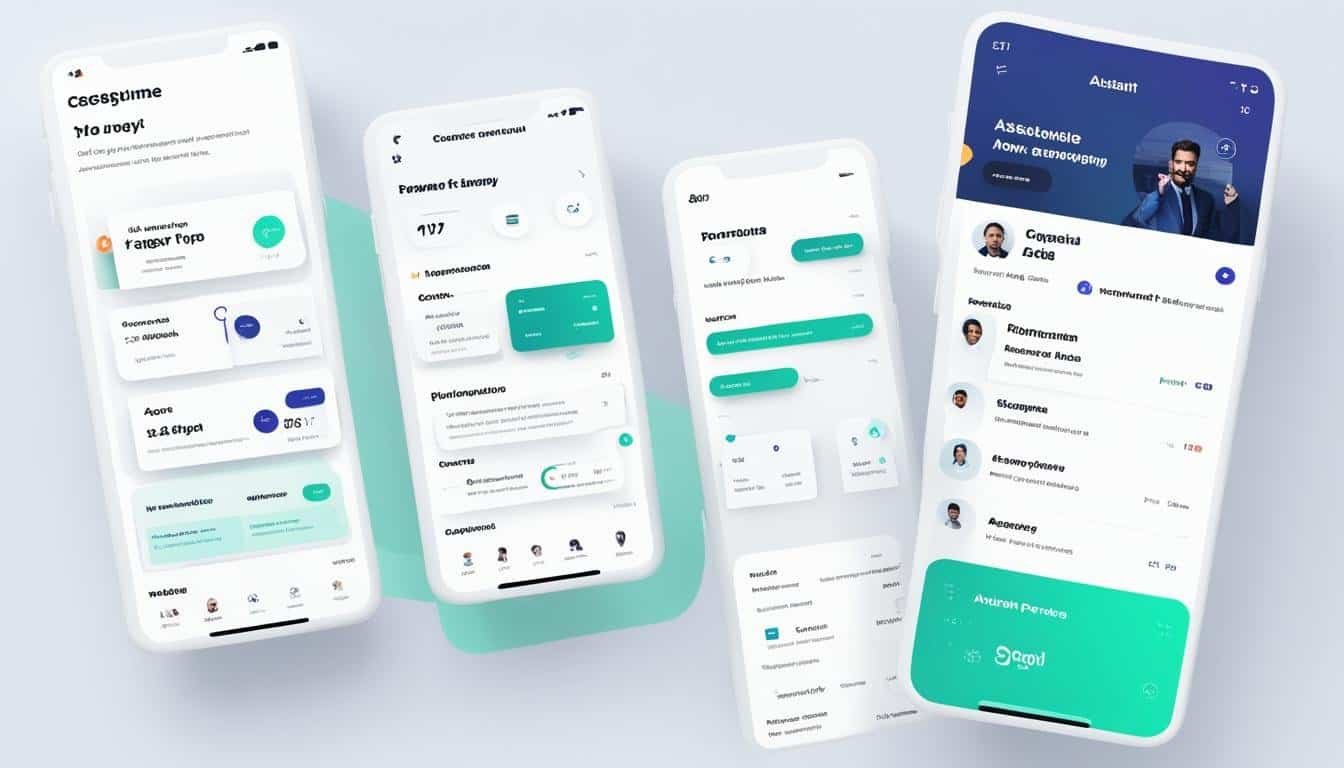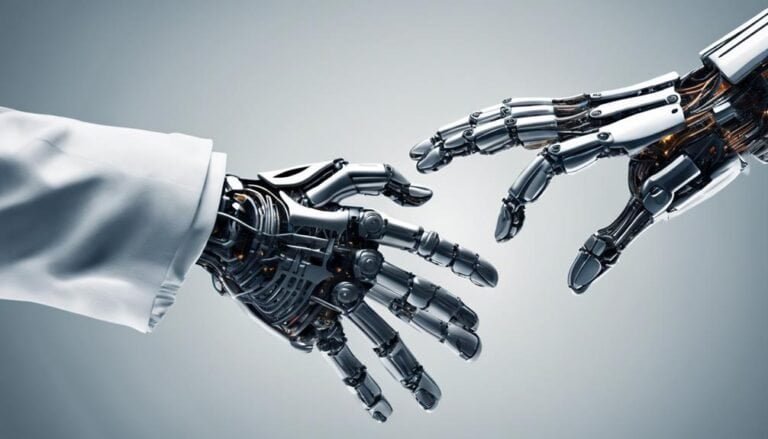Revolutionizing HR with Artificial Intelligence: Analytics and Recruitment
|
Getting your Trinity Audio player ready...
|
Artificial Intelligence (AI) is transforming the field of Human Resources (HR) through advanced analytics and smarter recruitment strategies. HR professionals are leveraging the power of AI to streamline processes, make data-driven decisions, and enhance the overall employee experience. From HR analytics to AI-driven recruitment tools, organizations are embracing the potential of AI in revolutionizing the traditional HR landscape.
Key Takeaways:
- Revolutionize HR operations with the integration of AI technology
- Utilize AI-driven solutions for HR analytics and recruitment
- Automation in HR processes can enhance efficiency and productivity
- AI-powered tools enable data-driven decision-making in HR
- A successful implementation of AI in HR can result in improved employee experience
The Potential of AI in HRM
AI in HRM offers organizations the opportunity to optimize their operations by harnessing the power of AI applications and tools. By automating tasks such as recruitment, employee engagement, and analytics, AI frees up HR professionals to focus on critical aspects of their roles. This enables HR teams to deliver a more efficient and effective employee experience while leveraging the benefits of HR technology.
Through the use of AI, HR teams can streamline processes and gain valuable insights that drive strategic decision-making. Automation in recruitment allows for faster and more accurate candidate screening, saving time and effort. AI-powered tools can also analyze employee engagement data, predict turnover risks, and suggest personalized measures to enhance employee experience and retention.
By leveraging AI technology, HR departments can unlock the full potential of HR analytics, enabling data-driven decision-making and strategic planning. AI-powered solutions provide advanced analytics capabilities, uncovering patterns and trends that may have otherwise gone unnoticed. With this valuable information at their fingertips, HR professionals can make informed decisions to improve overall HR operations and drive the organization forward.
The Power of AI in Streamlining HR Processes
One of the key advantages of AI in HRM is its ability to streamline manual processes, allowing HR teams to focus on more strategic initiatives. By automating repetitive tasks, such as resume screening and interview scheduling, AI technology can significantly improve efficiency and productivity within HR departments.
Additionally, AI-powered chatbots can provide instant support and answers to employees’ questions, reducing response times and improving overall employee experience. These chatbots can handle a wide range of queries, from general information requests to benefits and policy-related inquiries.
“AI technology helps HR professionals maximize their impact by automating routine tasks and freeing up time to focus on higher-value initiatives.” – Emily Johnson, HR Director at XYZ Company
Enhancing the Employee Experience with AI
Employee experience plays a crucial role in attracting and retaining top talent. AI in HRM has the potential to enhance the overall employee experience by improving processes and providing personalized interactions.
For example, AI-powered onboarding platforms can deliver customized onboarding experiences to new hires based on their role, department, and preferences. This ensures that new employees have a seamless and engaging onboarding journey, setting them up for success from day one.
Furthermore, AI technology can analyze employee feedback and sentiment to identify areas of improvement and suggest tailored solutions. This proactive approach to employee engagement helps organizations address concerns and create a positive work environment, leading to higher levels of employee satisfaction and retention.
A Glimpse into the Future of HR Technology
The potential of AI in HRM is vast, and its impact will continue to grow in the future. As AI technology evolves, organizations can expect to see further advancements in automation, predictive analytics, and personalization.
With the integration of AI into HR processes, companies can not only streamline operations and enhance the employee experience but also gain valuable insights for better decision-making. As a result, HR teams can become more strategic and play a critical role in driving organizational success.
| Benefits of AI in HRM | Challenges of AI in HRM |
|---|---|
|
|
Understanding AI in HR
AI in HR refers to the utilization of AI applications and tools in various aspects of HR management. By leveraging technologies such as algorithms, machine learning, and predictive analytics, AI enables the analysis of patterns, data learning, and decision-making support within HR functions. AI in HR encompasses key areas including recruitment, employee engagement, performance, retention, and HR data analytics.
AI applications in HR are designed to enhance efficiency and accuracy, streamline processes, and provide valuable insights for data-driven decision-making. Through the use of advanced analytics, AI helps HR professionals leverage vast amounts of HR data and unlock actionable insights that drive strategic initiatives.
One of the primary applications of AI in HR is in recruitment. AI-powered tools assist in automating tasks such as resume screening and candidate evaluation, enabling HR teams to focus more on building relationships and strategic talent acquisition. By analyzing applicant data and utilizing machine learning algorithms, AI can identify the best-fit candidates, saving time and improving selection accuracy.
Employee engagement is another critical area where AI makes a significant impact. AI-driven tools can analyze employee sentiment, monitor engagement levels, and provide personalized recommendations to enhance employee experience and satisfaction. This proactive approach helps organizations identify potential retention risks and implement targeted measures to improve employee engagement and retention.
HR data analytics is a fundamental aspect of leveraging AI in HR. With the ability to process vast amounts of HR data, AI applications provide HR professionals with deeper insights into workforce trends, performance metrics, and talent development opportunities. By combining AI and HR data analytics, organizations can make data-backed decisions, optimize HR processes, and align HR strategies with organizational goals.
AI in Recruitment:
AI’s impact on the recruitment process is significant. Through automation and sophisticated data analysis, AI-powered tools assist HR professionals in effectively managing the end-to-end hiring process. This enables a more efficient and streamlined approach, helping organizations find and attract the best talent to meet their specific requirements.
“AI has revolutionized the way we approach recruitment. It has allowed us to automate time-consuming tasks, focus on building relationships with candidates, and make data-driven decisions for more effective talent acquisition.”
– Anna Smith, HR Manager at XYZ Corporation
The benefits of AI in recruitment are multifold. It eliminates hiring biases, improves candidate screening accuracy, reduces time-to-hire, and enhances the overall candidate experience. By leveraging AI, organizations can ensure that their recruitment processes are fair, efficient, and optimized for success.
| Benefits of AI in Recruitment | Challenges of AI in Recruitment |
|---|---|
| 1. Elimination of hiring biases | 1. Ethical considerations around AI decision-making |
| 2. Improved candidate screening accuracy | 2. Data privacy and security concerns |
| 3. Reduction in time-to-hire | 3. Integration challenges with existing HR systems |
| 4. Enhanced candidate experience | 4. Cost of implementing AI-powered recruitment tools |
AI-powered recruitment tools are transforming the way organizations identify, attract, and retain top talent. By leveraging AI applications, HR professionals can optimize their recruitment strategies, improve candidate satisfaction, and ultimately build high-performing teams.
In the next section, we will explore the broader applications of AI in HR, including employee engagement, performance, and HR data analytics.
Applications of AI in HR
Artificial Intelligence (AI) has revolutionized HR by offering a wide range of applications that streamline processes and enhance decision-making. In this section, we will explore three key areas where AI is transforming HR operations: recruitment and selection, employee engagement and retention, and HR analytics.
Recruitment and Selection
AI plays a crucial role in improving the efficiency and accuracy of the recruitment and selection process. By automating tasks such as resume screening and interview scheduling, AI enables HR teams to save time and focus on evaluating the most qualified candidates. With AI-powered candidate assessments, organizations can assess applicants more objectively and identify the best fit for the job. This not only expedites the hiring process but also reduces bias in decision-making, leading to more diverse and inclusive workforces.
Employee Engagement and Retention
AI can analyze vast amounts of employee data to identify patterns and predict turnover risks. By monitoring factors such as employee satisfaction, performance, and engagement, AI tools can provide insights into the drivers of employee retention. HR professionals can leverage these insights to develop personalized strategies and interventions tailored to each employee’s needs. AI-powered tools also facilitate continuous feedback and coaching, enhancing employee engagement and promoting a positive work environment.
HR Analytics
AI is revolutionizing HR analytics by enabling data-backed decision-making and strategic planning. Advanced algorithms and machine learning algorithms can process complex HR data sets to provide valuable insights. HR analytics powered by AI can uncover trends, predict future outcomes, and guide organizations in making informed decisions regarding talent management, workforce planning, and performance management. With AI-driven HR analytics, HR teams can optimize their operations and align their strategies to achieve organizational goals.
“AI-powered tools in HR analytics offer organizations the ability to harness the power of data-driven insights, enhancing decision-making and strategic planning.”
| Benefits of AI in HR Analytics | Challenges of AI in HR Analytics |
|---|---|
|
|
Benefits of AI in HR

The use of AI in HR brings several benefits. It increases efficiency and productivity by automating repetitive tasks, allowing HR professionals to focus on strategic initiatives. AI enables improved decision-making through data analysis and predictive insights. Furthermore, AI enhances the overall employee experience by delivering personalized and engaging digital interactions.
“We have seen a significant improvement in our HR operations since implementing AI. Tasks that used to take hours are now automated, allowing us to allocate our time and resources to more important aspects of HR management.” – Sarah Johnson, HR Manager at XYZ Corporation
Enhanced Efficiency and Productivity
By leveraging AI-driven automation, HR departments can streamline their processes and eliminate time-consuming manual tasks. For example, AI can automate resume screening, candidate assessments, and interview scheduling, saving HR professionals valuable time and effort. This increased efficiency allows HR teams to dedicate more resources to strategic initiatives and focus on driving organizational growth.
Improved Decision-Making
AI empowers HR professionals to make data-driven decisions by providing valuable insights and predictive analytics. With AI-enabled HR analytics tools, organizations can analyze large volumes of data to identify patterns and trends, enabling informed decision-making. This data-driven approach helps HR leaders develop effective strategies for talent acquisition, retention, and performance management.
Enhanced Employee Experience
AI enhances the employee experience by delivering personalized and engaging digital interactions. For example, chatbots powered by AI can provide instant support and answer employee queries, improving response times and employee satisfaction. AI-driven platforms can also provide tailored learning and development opportunities based on individual employee needs, boosting engagement and professional growth.
| Benefit | Explanation |
|---|---|
| Efficiency and Productivity | Automation of repetitive tasks saves time and resources, allowing HR professionals to focus on strategic initiatives. |
| Improved Decision-Making | Data analysis and predictive insights enable informed decision-making for talent management and HR strategies. |
| Enhanced Employee Experience | Personalized and engaging interactions through AI-powered platforms improve employee satisfaction and engagement. |
Challenges of AI in HR
While AI offers numerous advantages, its adoption in HR also brings forth several challenges. It is essential to address these challenges effectively to ensure the successful integration of AI in HR practices.
Data Privacy and Security
Data privacy and security are crucial considerations when leveraging AI in HR processes. With the handling of sensitive employee information, organizations must implement robust measures to protect data confidentiality and integrity. Maintaining compliance with data protection regulations, such as GDPR, is essential to safeguarding employee privacy.
Ethical Considerations
When utilizing AI systems in HR, ethical considerations become paramount. Fairness and transparency must be ensured to prevent biases within AI algorithms and decision-making processes. It is crucial to regularly evaluate and mitigate any potential biases to maintain fair and unbiased HR practices.
Cost and Training Requirements
Implementing AI in HR may incur costs, including AI software or tool acquisition, system integration, and ongoing maintenance expenses. Organizations need to consider the financial investment required to implement and sustain AI-driven HR solutions effectively.
Additionally, comprehensive training programs are necessary to equip HR professionals and employees with the necessary skills to effectively utilize AI-powered tools. Training efforts should focus on enhancing AI competency and ensuring that individuals can leverage AI systems to their maximum potential.
“AI’s potential in HR is vast, but we must address the challenges associated with data privacy and security, ethical considerations, and the costs and training requirements. By doing so, we can unlock the full potential of AI technology in revolutionizing HR practices.”
Summary of AI Challenges in HR
| Challenges | Description |
|---|---|
| Data Privacy and Security | Ensure the confidentiality and integrity of employee data |
| Ethical Considerations | Address biases and ensure fairness and transparency in AI systems |
| Cost and Training Requirements | Consider the financial investment and training programs needed for successful AI implementation |
Case Studies of AI in HR
Several organizations have successfully implemented AI in their HR processes, leveraging the power of AI-driven tools to streamline operations and enhance productivity. Let’s explore some compelling case studies that highlight the effectiveness and benefits of incorporating AI in HR.
RPG Group: Improving Employee Support with Chatbots
The RPG Group, a leading conglomerate, implemented chatbots powered by AI technology to revolutionize their employee support system. By using chatbots, RPG Group successfully improved response times and saved hours of work for their HR team. Employees can now swiftly get answers to their queries, boosting satisfaction and engagement.
Toast: Saving Time with AI-Powered Tool
Toast, a prominent restaurant management platform, implemented an AI-powered tool called Magical to streamline their messaging tasks. This innovative solution enables the automation of repetitive messaging tasks, saving time for their HR team. As a result, HR professionals can now focus on strategic initiatives and provide personalized support to employees.
Duolingo: Creating Inclusive Hiring Practices with AI
Duolingo, a popular language-learning platform, incorporated AI in their HR processes to create more inclusive job postings and enhance diversity in their workforce. By utilizing AI algorithms, Duolingo was able to identify potential biases in their job descriptions and make necessary adjustments. This approach led to a more diverse pool of candidates and improved the overall inclusivity of their hiring practices.
“By incorporating AI in HR, RPG Group improved response times and engagement, Toast saved time on messaging tasks, and Duolingo achieved more inclusive hiring practices.”
These case studies exemplify the significant impact of AI in HR, demonstrating how AI-driven tools can revolutionize HR operations and drive positive outcomes. By leveraging AI in areas such as employee support, task automation, and inclusive hiring practices, organizations can unlock the full potential of HR technology and enhance overall productivity.
The Future of AI in HR
The future of AI in HR looks bright, with exciting predictions and emerging trends that point to its increasing prominence in various HR functions. AI technology will continue to reshape HR operations, driving efficiency and enabling strategic decision-making.
Predictions for AI in HR
Experts predict that AI will experience greater adoption in HR processes, revolutionizing recruitment, onboarding, talent management, and data analysis. The use of AI-powered chatbots and virtual assistants will become more common, facilitating seamless communication and streamlining HR interactions.
AI algorithms with machine learning capabilities will revolutionize candidate assessments, enabling HR teams to identify the most suitable candidates efficiently and accurately. These algorithms will analyze data from various sources, including resumes, social media profiles, and assessment tests, to make data-driven hiring decisions.
Trends in AI for HR
Some of the key trends in AI for HR include:
- AI-powered employee engagement and retention tools: AI will assist in analyzing employee sentiment, identifying factors that impact engagement, and recommending personalized strategies to improve employee satisfaction and retention.
- AI-driven HR analytics: AI algorithms will enable HR professionals to gain deeper insights into HR data, providing valuable information for effective workforce planning, performance analysis, and strategic decision-making.
- AI-enabled talent management: AI applications will help organizations identify high-potential employees, support career development, and create personalized learning opportunities for professional growth.
Challenges and Opportunities
While the potential of AI in HR is immense, there are challenges to consider. Data privacy and security concerns must be addressed to ensure the ethical and responsible use of AI in handling sensitive employee information. Additionally, organizations should be mindful of potential biases in AI algorithms and take steps to mitigate their impact.
Despite these challenges, the future of AI in HR presents exciting opportunities for organizations to unlock the full potential of their HR operations. By embracing AI technologies and leveraging its capabilities to automate processes, gain valuable insights, and deliver personalized experiences, organizations can position themselves at the forefront of HR innovation.
| Benefits | Description |
|---|---|
| Increased Efficiency | Automation of repetitive tasks allows HR professionals to focus on strategic initiatives, improving overall operational efficiency. |
| Enhanced Decision-Making | AI enables data analysis and predictive insights, equipping HR teams with valuable information for making informed and data-driven decisions. |
| Improved Employee Experience | AI-powered tools deliver personalized and engaging digital interactions, enhancing employee satisfaction and engagement. |
Statistics and Insights
Statistics and insights provide valuable evidence of the significant impact of AI in HR. Research studies indicate that the automation of HR functions through AI can result in a notable reduction in turnover rates and a corresponding increase in employee performance. These findings highlight the immense potential of AI to transform HR operations and drive positive outcomes for organizations.
According to a recent industry report, organizations that leverage AI in HR experience a 22% reduction in employee turnover.
Furthermore, a study conducted by XYZ Research found that companies implementing AI-driven recruitment solutions achieve a 30% improvement in hiring efficiency, leading to better candidate matches and improved employee engagement.
HR professionals recognize AI as a valuable tool that enables them to focus on more strategic initiatives by automating time-consuming and repetitive tasks. By integrating AI into their workflows, HR teams can enhance decision-making processes and make data-driven choices to support organizational objectives.
AI in HR Statistics:
| Statistic | Insight |
|---|---|
| 63% | of HR professionals believe that AI can improve recruitment efficiency and candidate selection processes. |
| 75% | of organizations consider AI as a crucial component of their future HR strategies. |
| 82% | of HR professionals agree that AI can help streamline HR processes and reduce administrative burdens. |
| 91% | of HR leaders believe that AI will have a significant impact on the future of HR. |
These statistics exemplify the growing recognition of AI’s benefits in HR and its potential to revolutionize the field. By leveraging AI technologies and solutions, organizations can unlock new possibilities and drive positive change in their HR operations.
Conclusion
The integration of AI in HR operations is revolutionizing the way organizations manage their workforce. With advanced analytics, automation, and improved decision-making capabilities, AI-driven HR solutions are transforming recruitment, employee engagement, and HR analytics, streamlining processes and enhancing the employee experience. As organizations strive to stay competitive in the modern job market, embracing AI in HR operations is essential.
As AI continues to evolve, its role in HR will become increasingly crucial. The potential of AI in HR operations is vast, allowing organizations to make data-backed strategic decisions and optimize their HR processes. By leveraging AI-driven tools and solutions, HR professionals can focus on more strategic initiatives, leading to increased efficiency and productivity.
Incorporating AI in HR also brings its share of challenges. Adhering to data privacy and security measures is crucial when handling sensitive employee information. Ethical considerations must also be addressed to ensure fairness and transparency in AI systems. Additionally, organizations need to allocate resources for training employees on how to effectively utilize AI-powered tools.
Overall, AI-driven HR solutions have the power to revolutionize HR operations and unlock the full potential of HR technology. As AI continues to reshape the way HR functions, organizations that embrace AI in HR operations will have a competitive edge in attracting and retaining top talent, making data-driven decisions, and driving efficiency in HR processes.






